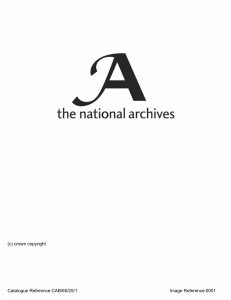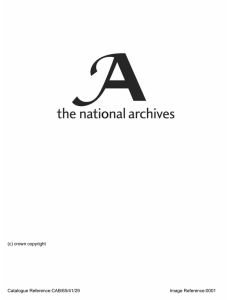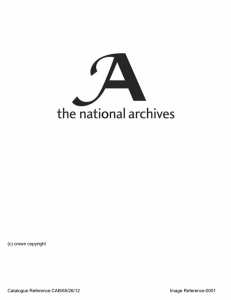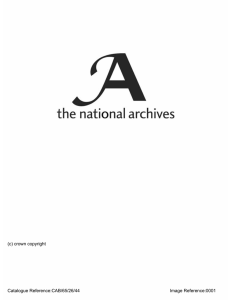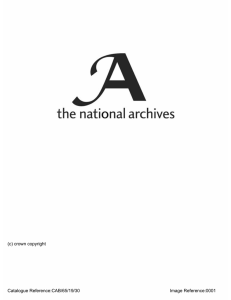(c) crown copyright Catalogue Reference:CAB/65/33/33 Image Reference:0001
advertisement
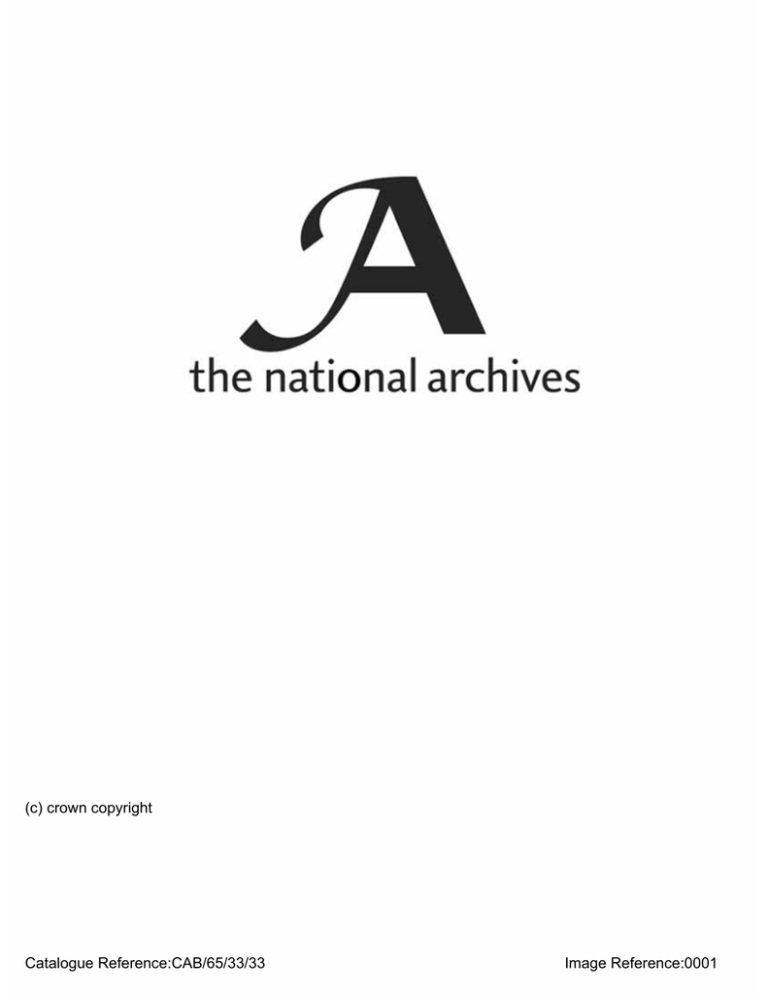
(c) crown copyright Catalogue Reference:CAB/65/33/33 Image Reference:0001 Printed for the\ WarCabinet. February1943 SECRET. 'MM... (43) TO BE KEPT mm LOCK AND KEY It is requested that special cape may be taken to ensure the secrecy of this document WAR CONCLUSIONS CABINET 38(48). of a Meeting of the War Cabinet held at 1 0 Downing S. W. 1, on Monday, February 2 2 , 1 9 4 3 , at 6 P.M. Street, Present: The Right Hon. C. R. ATTLEE, M.P., Deputy Prime Minister (in the Chair). The Right Hon. ANTHONY EDEN, M.P., The Right Hon. Sir JOHN ANDERSON, Secretary of State for Foreign M.P., Lord President of the Council. Affairs. The Right Hon. ERNEST BEVIN, M.P., The Right Hon. OLIVER LYTTELTON, M.P., Minister of Production. Minister of Labour and National . Service; The Right Hon. HERBERT MORRISON, M.P., Secretary of State for the Home Department and Minister of Home Security. The following were also present: The Right Hon. S. M. BRUCE, Sir RAMASWAMI MUDALIAR, RepresenRepresentative of the Government tative of India. of the Commonwealth of Australia. The Right Hon. Sir KINGSLEY WOOD, The Right Hon. VISCOUNT SIMON, M.P., Chancellor o f the Exchequer. Lord Chancellor. The Right Hon. L. S. AMERY, M.P., Colonel the Right Hon. OLIVER Secretary of State for India and STANLEY, M . P . , Secretary of State Secretary of State for Burma. for the Colonies (Item 4). The Right Hon. A. V . ALEXANDER, The Right Hon. Sir JAMES GRIGG, M.P., First Lord of the Admiralty. M.P., Secretary of State for War. The Right Hon. Sir ARCHIBALD The Right Hon. Sir STAFFORD CRIPPS, SINCLAIR, Bt., M.P., Secretary of K.C., M.P., Minister of Aircraft State for Air. Production. The Right Hon. R. S. HUDSON, M.P., The, Right Hon. BRENDAN BRACKEN, Minister of Agriculture and M.P., Minister of Information. Fisheries (Item 3). Sir ORME SARGENT, Deputy Under- Admiral of the Fleet Sir DUDLEY Secretary of State, Foreign Office. POUND, First Sea Lord and Chief of Naval Staff. Air Chief Marshal Sir CHARLES F. A. General Sir ALAN BROOKE, Chief of the PORTAL; Chief of the Air Staff. Imperial Genera! Staff: Secretariat : Sir EDWARB BRIDGES. Lieutenant-General Sir HASTINGS ISMAY. Mr. NORMAN BROOK. Mr. L. F. BURGIS. [250843 WAR CABINET 33 (13). CONTENTS. Minute NOi 1 , . , Subject. Naval, Military and Air Operations Air operations: Home Theatre. Mediterranean Theatre. Naval operations. Spain. Russia. V­ : Military operations: Tunisia. Russia. vAl ' ''' H Prisoners of War x '" 3 ' 4 .' 0 5. .... .... .... Italian Prisoners of War .... .... \ .... .... Vi .... ,. . .... ­ Refugees .... .... .... Reception and accommodation of refugees from enemy occupied . territory. Beveridge Report and Army Bureau of Current Affairs .... 1. Trie Chiefs of Staff reported the principal events of the past week. Operations. Bomber Command had attacked^Wilhetmshaveh (twice), Lorient (Previous and Bremen. Enemy losses had been 24 dest^^ Bfeferfenee: destroyed and 15 damaged. Our losses had been 11 fighters, W.M. (43) 3Qth '28 -bohibers, .3/Coastal Command aircraft and 4 Army Co-operation Conclusions,. . v Coinmahd aircraft. : v Mmtite; 1.) , . AirOperations: Home Theatre. Mediterranean Theatre. Naval "' Operations". Spain.' Russia. Military Operations. Tunisia. Russia. In the Mediterranean our aircraft had attacked 5 U-boats and hit 5 merchant ships. *. Shipping losses for the previous week amounted to 18,000 tons. This figure did not include losses in the two outgoing Atlantic convoys, which were now being attacked. ' A Spanish ship of some 6,000 tons, having.on board a cargo of platinum and 2 stowaways from the Graf Spee, had been intercepted, and a prize crew put on board. The Secretary of State for Foreign Affairs undertook to make enquiries regarding difficulties raised by the Russians to the installation by us at Murmansk of certain wireless apparatus which, we regarded "as of vital importance to our convoys to Russia. The Germans had delivered a successful attack against American forces the previous week in Central Tunisia. ! ;j The 8th Army had advanced some 70 miles since the previous week and was now in touch with the Mareth Line. Tripoli Harbour was now capable of handling some 4,000 tons a day. Fighting had taken place south Of Leningrad and in the Lake Ilmen district. The Russians were pushing strongly in the Orel sector. Further south they were making a thrust towards Dnepropetrovsk. East of this there had been heavy fighting at Krasnoarmeisk. The Germans were now evacuating troops from the Taman peninsula by air, by sea and across the Kerch Straits; The recent thaw had hampered Russian activities, but, according to the latest reports, the weather was hardening again. The War C a b i n e t - Took note of these statements. Prisoners of \ War. (Previous Reference: W.M. (43) 26th Conclusions, Minute 8;) T e , h Secretary of State for Foreign Affairs said that a report had been received from Geneva that a member of the Inter­ national Red Cross Organisation had been informed that in some of the German camps shackling was becoming merely symbolical H e was endeavouring to obtain confirmation o f this report. Meanwhile, it was still not possible to make any announcement as to the position m Parliament. The Secretary of State for Foreign Affairs also undertook t o enquire into the question whether His Majesty's Governments, communication to the German Government, as finally delivered by the Protecting Power, had differed in any point of substance from the text approved by the War Cabinet on the 8th February. 3. The War Cabinet had before them a. Memorandum by the Secretary of State for Foreign Affairs (W- P. (43) 73) regarding a sghehie forsegregatingIta.lian prisoners of war opposed to the Fascist regime and forming them into special Labour Battalions under their own leaders. This seheme had already been introduced in India, Should it be extended to Italian prisoners in Great , Britain and British East Africa ? It was explained that, if LaboUr Battalions were formed, the­ prisohers Would first be liberated and enlisted as volunteers under military law. This would ayoi contravention of the Geneva Cdhvehtibhi Moreoyer, such Lat r Battalions could be. quickly [25084] military imits, icultu I Fisheries ] said; that in -this ,dy b e i n g u s e d for work o f national vimportahce, - mainly in agriculture, and ifrona that point; of ??ew t h ^ f was h o further "advantage to be gained by segregating, anWFSt elemente into specialbattalions. Indeed, such acourse WO:, a ^htSuaU^^ c o S y ! Uken^as alwhole, by introducing a cause ot controversy into the camps. The War C a b i n e t - (1) Confirmed the approval already given by the. Secretary ot State for Foreign Affairs for the introduction of this ' scheme in India. / . \ , o\ Aereed that, subject to consultation with General ' ' S i r William Platt, the scheme might, be extended, on an experimental basis to Italian prisoners in British h,ast Africa, but not to Italian prisoners m other territories. n ( 8 Reception and Accommodation of Refugees from EnemyOccupied Territory. (Previous Reference: W.M. (43) 16th Conclusions, Minute 6.) 4. The Secretary of State for Foreign Affairs recalled that on the 11th January the W a r Cabinet had agreed that an approach should be made to the United States Government on the basis that the refugee problem as a whole should be regarded as a United Nations responsibility, in respect of which each nation should agree to make a definite contribution (W.M. (43) 6th Conclusions, Minute 4). These representations had so far elicited no response, and it was becoming difficult to hold the Parliamentary position on. the basis that we were engaged in international negotiations when in fact the United States Government had shown no readiness to discuss the matter. Should we continue to maintain that the problem, should be dealt with as a United-Nations responsibility, or should we consider making some independent contribution ? The Home Secretary and Minister of Home Security said that, while it would be possible to admit between 1,000 and 2,000 additional refugees into this country, he would not favour this being done except as part of a United Nations scheme. Those who were pressing for further concessions did. not, in his view, sufficiently realise the extent of the contribution already made by the British Commonwealth of Nations and the practical difficulties of trans­ ferring and maintaining any considerable proportion of those who might wish to escape from enemy-occupied territories. The War C a b i n e t ­ (1) Agreed that for the present we should maintain our attitude that this problem was one which should be dealt with on a United Nations basis, and that we'should not hold out any hope of receiving additional refugees in this country except as part of a United Nations agreement. ; (2) Invited the Secretary of State for foreign Affairs to continue to press for a reply to the enquiries already addressed to the United States Government in this matter. ­ (3) Decided that a statement should be made, in answer to a Parliamentary Question, showing the extent to Which refugees, had already been adinitted to British territory over a convenient period (possibly since the beginning of the War); and invited the Secretary Of'State for Foreign Affairs to submit for consideration by the..War'-Cabinet, the draft Of a Qhestion andAnswer on this point. ; J 127 Report and Army Bureau ol Current Affairs. (Previous Reference: W.M. (43) 5th Conclusions, Minute 1.) W.M. 33 (43). 5. The Secretary of State for War said that he had to answer a question in Parliament on the following day as to whether the pamphlet dealing with the Beveridge Report, prepared by the Army Bureau of Current Affairs, would now be circulated. In discussion, it was pointed out that one reason which had been given for the previous withdrawal of the pamphlet had been that it was inappropriate that the Beveridge Report should be discussed­ at debates neld under the aegis of A.B.C.A. before it had been debated in Parliament, and the impression had been given that the issue of the pamphlet had been postponed rather than cancelled. In the circumstances, the War Cabinet took the view that the Secretary of State for War should reply on the following lines : that he was considering the possibility of producing a more Comprehen­ sive brief than the earlier version, in a form suitable as a basis for A.B.C.A. discussions. The Secretary of State for War would, no doubt, also consult the Ministers concerned before authorising the issue of the revised brief, which would be limited to a summary of Sir William Beveridge's proposals, and the Governments decisions. Offices of the War Cabinet, S.W. 1, February 22, 1943. mm
